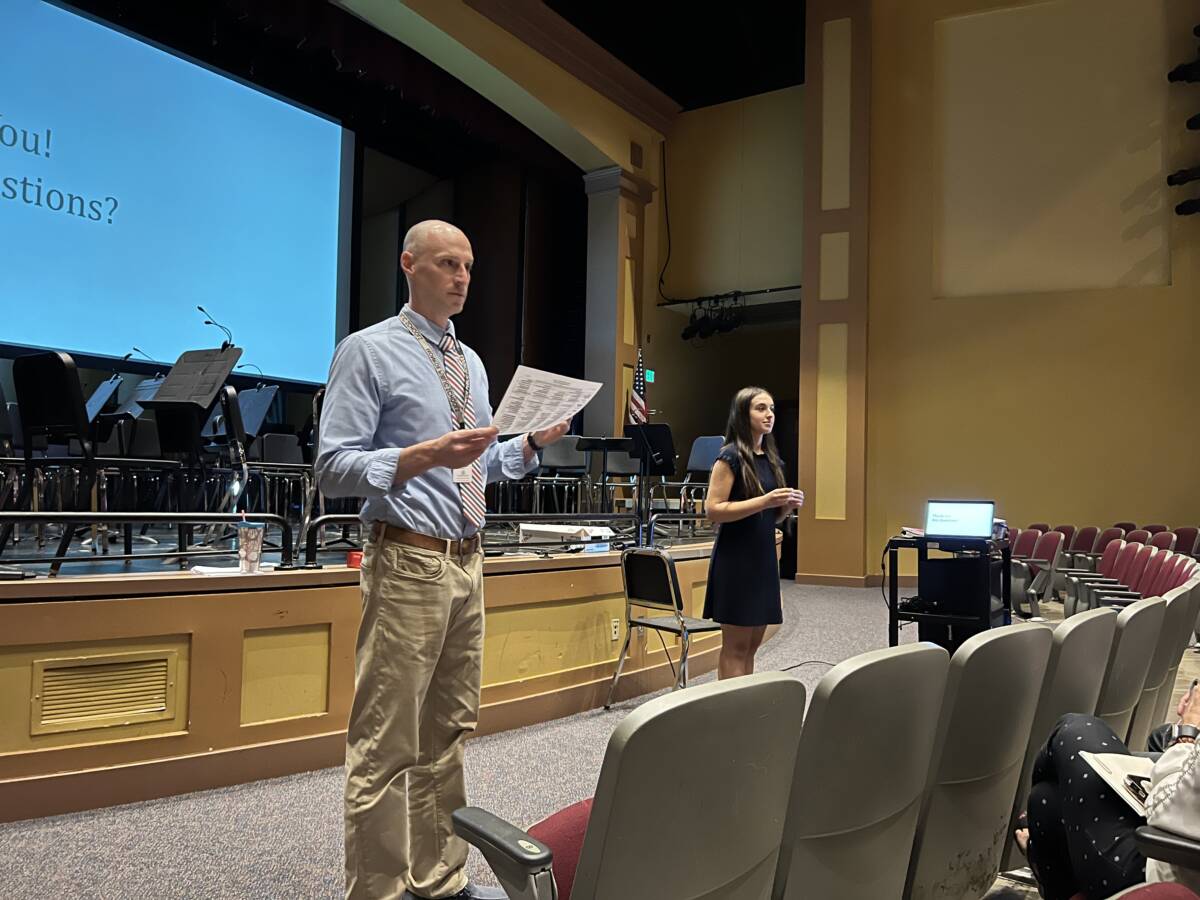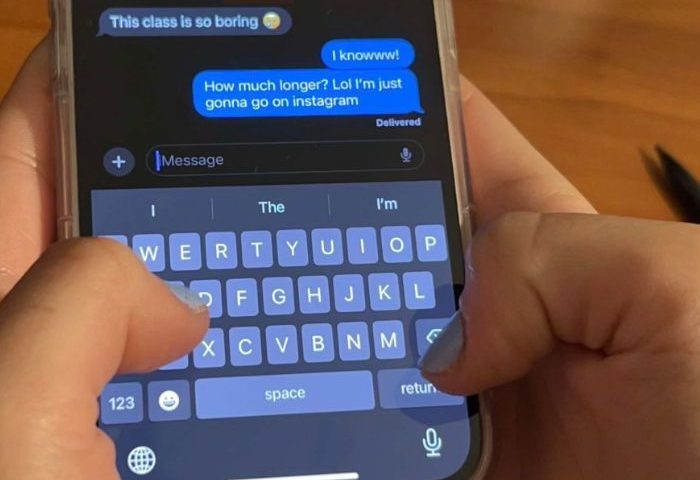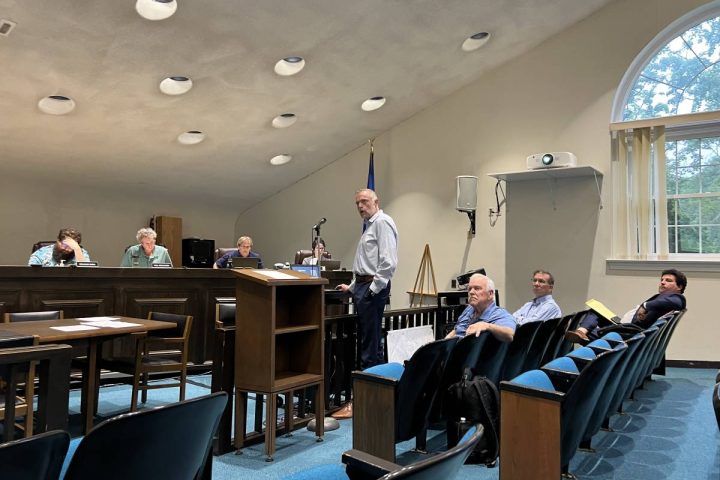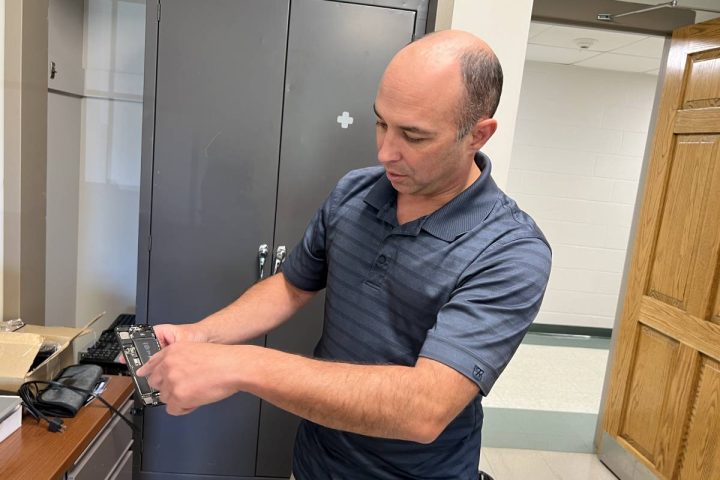Masuk High School seniors partner with a wide variety of mentors to do Capstone Projects with fieldwork in professions of their choice. Ken Rider, the lead Capstone teacher at Masuk, remembers a female student’s work with a beekeeper on a roof in the city, in which she learned the business, from tending to beehives, right down to selling the honey.
Another student got to participate in an aquarium program in California, immersing herself in biology for a week, according to Laurie Coville, an English teacher at Masuk.
The Capstone is a graduation requirement with work culminating in all students giving an 8-12 minute presentation before a panel of judges.
One recent Thursday morning, Rider, Coville and Andy Townsend, a social studies teacher, met with Capstone judges inside the school auditorium to train them on the oral presentation rubric, before judges ate lunch together in the media center, then visited classrooms to watch students’ presentations.
“Thank you for taking time out of your busy schedules,” Principal Steve Swensen said. “I think you’ll be impressed with the students and what they have been doing throughout the year. This is an exceptional program for the community and the kids.”
Laura Crowley, 17, a Masuk senior who already earned her Capstone credit, volunteered to give her presentation again, this time to the judges as an example. Her project was in forensic psychiatry and she worked remotely with Dr. Eindra Khin Khin in Washington, D.C.
“It’s a link between the field of psychology, mental health and the justice system,” Crowley explained. “I really enjoyed it. I think it gave me an opportunity to look into something I may not have pursued normally.”
She said the Capstone project taught her time management, professionalism and gave her confidence in herself in public speaking and reaching out to people.
‘The great equalizer’
Now in its 11th year, the Capstone was not immediately embraced by all students and parents when it started in 2013, a time when Superintendent of Schools Joseph Kobza was Masuk’s principal.
“It’s been phenomenal,” he said. “I like to call it the great equalizer, because if you choose a topic you’re really passionate about … I’ve seen some of the greatest presentations from these kids who really sink their teeth into their fieldwork hours — regardless of historic academic performance.”
“I think it’s exceptional,” Swensen said. “The learning the kids have is actually experiential learning, which there’s no substitute for, so I think it’s invaluable and I love the community-school relationships and partnerships that have been built. I think the community is impressed by the students’ ability to perform and their knowledge.”
“There’s a certain energy in the building,” Swensen said of the day of oral presentations. “Kids are nervous, but it’s a healthy level of anxiety.” And students have a sense of accomplishment when they’re done, he added.
“A lot of graduates come back and say this was the most valuable experience they had,” Swensen said of the Capstone. “A lot of other schools come here to talk about our Capstone program as a model.”
“We had a lot of students reluctant to do this, who say afterward this was really a valuable experience,” Rider said, adding of the topics, “it has to be something they’re interested in that stretches their skills. Parents have to agree it’s appropriate.”
Capstone requirements
Students complete a minimum of 20 hours of fieldwork with their mentors, while compiling a portfolio of research and written reflection, leading up to the 8-12 minute presentation before a panel of judges.
A Capstone portfolio includes a letter of intent, a mentor/parent acknowledgement form, a Capstone advisor meeting, an annotated biography, journal hours 1-10, journal hours 11-20, a short fieldwork video, a time log signed by the mentor, a letter of recommendation from the mentor, a thank you letter to the mentor, and a reflection paper with mentions of two or three competencies they met in the Vision of the Graduate.
The Vision of the Graduate competencies include critical thinking/problem solving, communication, curiosity, empathy and compassion, and social emotional readiness.
Each judge is assigned to a classroom composed of a teacher and community judges, five senior presenters, and a handful of juniors observing the event in preparation for their presentations in 2024.
Students are encouraged to use an organizational tool in their presentations and most use Google Slides. They should have clear sections: introduction/topic selection, fieldwork, learning stretch, personal growth, Vision of the Graduate, impact of the project/closure.
Students should emphasize speaking rather than reading their presentation. They must describe their fieldwork and what insights were gained from the experience. Their presentations should describe how their Capstone Project did or might change their lives and/or professional goals.
The Capstone Presentation Rubic has a total of 54 points and 40 are needed to pass.
Judging criteria
There are several factors a judge uses to come up with a Capstone score. For example, whether a student maintains eye contact, speaks clearly and confidently, engages the audience and appears calm and confident throughout the presentation.
Townsend said students can use humor in their openings to calm their nerves.
“One girl had an interesting opening,” he recalled. “She said, ‘I love going to the gynecologist …’ People were like what? Then she said, ‘said no one ever.'”
Coville said many students use a ton of pictures in their presentations and she remembers a male student who built a transmission.
One of the scoring factors is whether a student is dressed appropriately.
Though a presentation can be 8 to 12 minutes, educators want it to be at least 10 minutes. A student can also lose points for going over the time limit.
There is a question and answer period at the end of a presentation.
“We’re not trying to get them on the questions,” Townsend said. “If they didn’t mention their learning stretch enough, here’s a chance to ask them to explain it further. It’s not to stump them.”
“You evaluate the presentation in front of you,” Rider said. “You don’t compare it to another student.”
After the judging, a teacher lets students know if they passed or not.
Way beyond TV
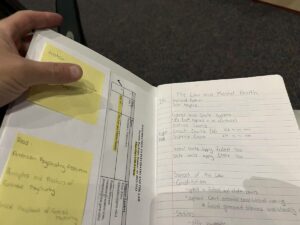
Of why she chose her topic, Crowley said she is among the people who watch an episode of “Criminal Minds” and think, “how cool would it be to profile a serial killer?”
During her presentation, she said forensic psychiatry deals with mental illness and the justice system. She said these professionals act as experts, who can testify on the insanity defense in court and evaluate someone’s competency to stand trial.
Forensic psychiatrists also work with prison inmates with mental health issues to prevent further incarcerated scenarios, according to Crowley.
When someone seeking asylum in the U.S. has had traumatic events in their lives, Crowley said a forensic psychiatrist evaluates their ability to be a functioning and stable member of society before they can have citizenship.
Crowley said the difference between psychology and psychiatry, is that psychiatry is in the medical field. “I learned a lot less about disorders and more about diagnosis and treatment, which I had never learned before,” she said.
Her mentor assigned the book, “Learning Legal Reasoning”, which taught Crowley to read court proceedings and legal documents.
“I thought I already knew a lot about these fields through research I did on my own and the shows I watched, but I really learned that there is so much in this field that I barely scratched the surface with 20 hours of fieldwork — and there is so much more I can learn,” Crowley said.
During her Capstone, Crowley took seminars over the summer and met more professors in the specialty. She was in a seminar for third year medical residents, who were in their mid-20s. She said one student mistook her for a resident.
Crowley also spoke with a judge, who works at a mental health court in Washington D.C., working with psychiatrists on treatment plans, rather than incarceration in some cases. “That’s what I’d want to do in the future in this field,” Crowley said.
Crowley showed a video of a mock trial.
She had one-on-one questions with her mentor and asked about the career path to become a forensic psychiatrist.
Dr. Khin Khin told her she would need four years as an undergraduate, four years of medical school and four years of a psychiatry residency, with an additional year in a specialty for forensic psychiatry.
“I was unsure if that was the path for me, but it was really interesting to learn from her experience,” said Crowley, adding they also talked about schools with accelerated learning.
Crowley said she benefited from having to manage her schedule to block out time to attend the seminars, which she gained a lot of confidence from being involved in.
She said she wanted to exude a certain level of professionalism so she would not seem too immature while speaking with doctors, professors and college students. “I learned how to craft perfect emails and present myself on Zoom, which will help with the rest of my life and career,” she said.
The Vision of the Graduate competencies were her curiosity and need for empathy and compassion, while working with patients.
After graduating from Masuk, Crowley plans to attend Loyola University Maryland to pursue a degree in psychology and see where her college career takes her as far as specialities.
“I learned of the change I want to make with the way mental health is seen in the criminal justice system,” she said of her Capstone Project, “and I will take what I learned with this, and in my future, just be a small part of the change that needs to happen.”
A judge asked Crowley if she had any advice to other students doing their Capstone Project. She said, “just be passionate about what you’re doing, so you’re more confident in what you’re talking about.”
All respectful comments with the commenter’s first and last name are welcome.

